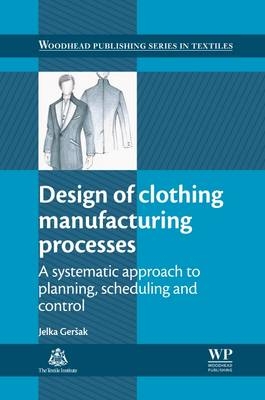
Design of Clothing Manufacturing Processes
Woodhead Publishing Ltd (Verlag)
978-0-85709-778-1 (ISBN)
- Titel erscheint in neuer Auflage
- Artikel merken
Dr. Sc. Jelka Geršak is Professor of Clothing Science and Head of Research and Innovation Centre for Design and Clothing Science at the Faculty of Mechanical Engineering, University of Maribor, Slovenia. She has extensive experience in clothing science related to the design of clothing manufacturing processes, the mechanics of textile structures and their behaviour, objective evaluation of clothing appearance, physiology of clothing and wearing comfort. Her research focuses on clothing science and human thermal physiology, based on the study of complex aspects of clothing system, textile structures and their performance, comfort in the actual environment, and more recently smart clothing. She is internationally renowned for her wide-ranging research in textile materials, clothing science and comfort.
Woodhead Publishing Series in Textiles
Preface
Chapter 1: Clothing classification systems
Abstract:
1.1 Introduction
1.2 General clothing classification
1.3 Harmonised clothing classification systems
1.4 Classification of functional clothing
1.5 Conclusions
Chapter 2: Clothing sizing systems
Abstract:
2.1 Introduction
2.2 Clothing size and designation systems: a chronological review
2.3 European and international sizing systems
2.4 ISO clothing sizing systems
2.5 European designation of clothing sizes
2.6 The JUS clothing sizing systems
2.7 Conclusions
Chapter 3: Key issues in developing a garment collection
Abstract:
3.1 Introduction
3.2 New product development
3.3 Garment collection development
3.4 Developing the concept for a new collection
3.5 Collection development management and control
3.6 Design and manufacturing requirements for a collection
3.7 Design aspects of functional protective clothing: a case study
3.8 Fashion trade fairs and garment collections
3.9 Conclusions
Chapter 4: Planning and organisation of clothing production
Abstract:
4.1 Introduction
4.2 Production planning and organisation within a company
4.3 Clothing-design analysis and activity planning
4.4 Key documentation
4.5 Conclusions
Chapter 5: Planning of clothing design, pattern making and cutting
Abstract:
5.1 Introduction
5.2 Constructing garment patterns
5.3 Pattern-pieces and their preparation
5.4 Pattern cutting-markers
5.5 Designating cutting-markers
5.6 Defining fabric and other parameters
5.7 Technological requirements when arranging pattern-pieces within a cutting-marker
5.8 Cutting-marker efficiency
5.9 Fabric losses outside the cutting-marker
5.10 Determining fabric consumption
5.11 Conclusions
Chapter 6: Planning clothing manufacturing
Abstract:
6.1 Introduction
6.2 Analysis of clothing manufacture requirements and selection of appropriate equipment
6.3 Joining technologies
6.4 Work analysis
6.5 Identifying work methods
6.6 Selecting processing equipment
6.7 Types of sewing machine
6.8 Determining standard time
6.9 Planning manufacturing operations
6.10 Planning clothing assembly
6.11 Planning a process system for manufacturing operations
6.12 Planning clothing manufacturing processes
6.13 Conclusions
Chapter 7: Clothing production management
Abstract:
7.1 Introduction
7.2 Determining production capacity needs
7.3 Production planning
7.4 Production scheduling
7.5 Production monitoring and control
7.6 Costs in production planning and management
7.7 Controlling production planning and management
7.8 Conclusions
Chapter 8: Quality requirements for clothing materials
Abstract:
8.1 Introduction
8.2 Quality requirements for textile materials for clothing
8.3 Physical characteristics: types, methods of measurement and tolerances
8.4 Performance characteristics: types, methods of measurement and minimum quality standards
8.5 Visible faults
8.6 Care labelling of clothing and textile products
8.7 Ecological labelling of clothing and textile products
8.8 Conclusions
Index
| Reihe/Serie | Woodhead Publishing Series in Textiles |
|---|---|
| Verlagsort | Cambridge |
| Sprache | englisch |
| Maße | 156 x 234 mm |
| Gewicht | 640 g |
| Themenwelt | Technik |
| ISBN-10 | 0-85709-778-4 / 0857097784 |
| ISBN-13 | 978-0-85709-778-1 / 9780857097781 |
| Zustand | Neuware |
| Haben Sie eine Frage zum Produkt? |
aus dem Bereich



